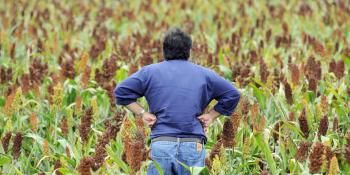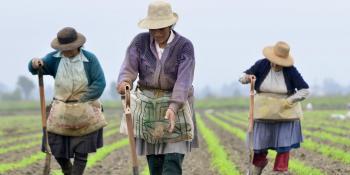Can we tackle climate threats to Pacific Island food security?

Pacific Island food systems face enormous climate challenges, but visioning future scenarios can help navigate change.
 Climate impacts in the Pacific Islands – which rely on fishing and small-scale farming for sustenance – are set to intensify pressure on this region’s food security, according to a new report published on World Oceans Day. But innovative, participatory approaches may help policymakers navigate possible future scenarios in order to
Climate impacts in the Pacific Islands – which rely on fishing and small-scale farming for sustenance – are set to intensify pressure on this region’s food security, according to a new report published on World Oceans Day. But innovative, participatory approaches may help policymakers navigate possible future scenarios in order to 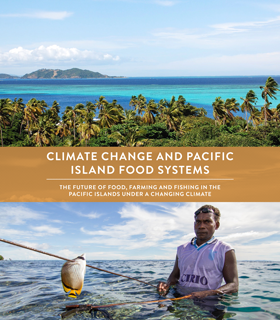 develop the right policy responses.
develop the right policy responses.
The new report 'Climate change and Pacific Island Food Systems' outlines the most pressing issues facing this region, using vivid infographics, and photos to illustrate temperature and rainfall extremes; sea level rise; impacts on food crops, fisheries and aquaculture, and food and nutrition. The report sheds light on the major threats facing the region’s food security such as rising sea-levels, more violent tropical cyclones and droughts. It also highlights potential opportunities to be gained under climate change and innovative approaches to navigate change.
Climate impacts: temperature and rainfall
According to the report, all Pacific Island countries and territories will warm by up to 3.5°C by 2100, with ever more regular temperature extremes. This will also increase the frequency and intensity of extreme rainfall events
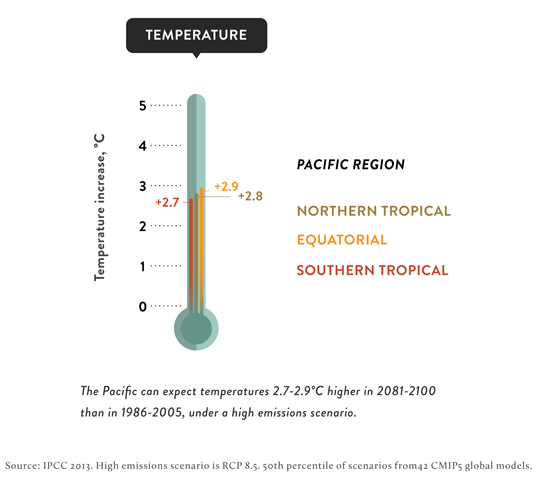
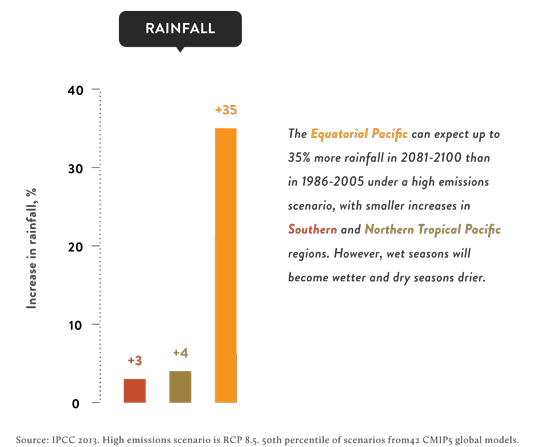
Climate impacts: sea level rise
Sea level rise poses a huge threat in the Pacific Region where most islands lie at very low elevations. The worst scenarios predict a rise of up to 80 cm by 2100, threatening islands such as Tuvalu, Marshall Islands and Kiribati which have an average elevation above sea level of 2 meters or less.
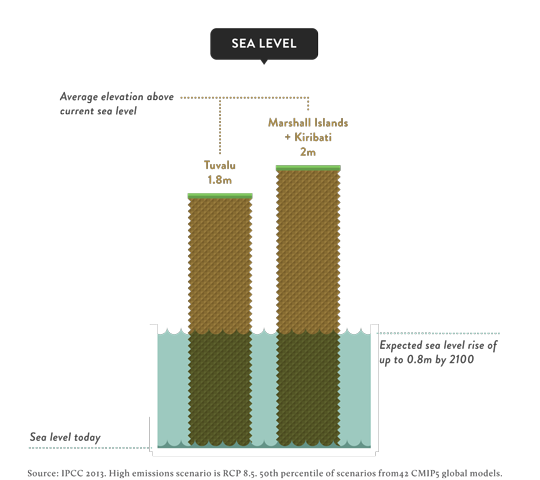

Farming under a changing climate
Pacific Island farms produce staple food crops (for local consumption), as well as high value horticulture crops and export commodities, which bring precious income to farmers. Changes in temperature and rainfall will affect some crops more severely than others, bringing new challenges to food security and potentially hurting incomes. Of the major cash crops, coffee is projected to be the most susceptible to global warming. The good news is that some Pacific staple food crops – such as breadfruit, cassava and giant taro – are more climate-resilient.
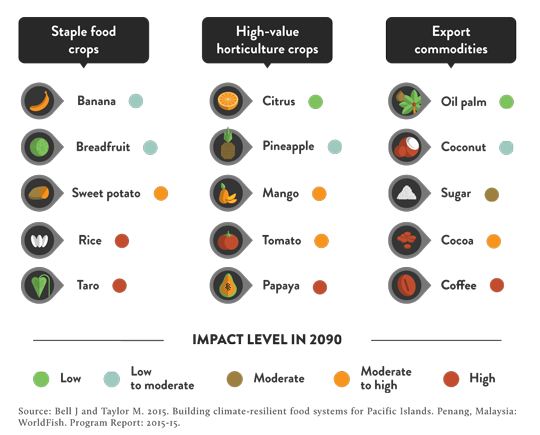
Skipjack tuna fisheries
Tuna is a crucial species in the Pacific Island region, both for local consumption and for export. Warming waters in the tropical Pacific are expected to affect their abundance and distribution. For example, skipjack tuna stocks will shift eastward, making it difficult for people in the western part of the Pacific Island region to catch this important fish.
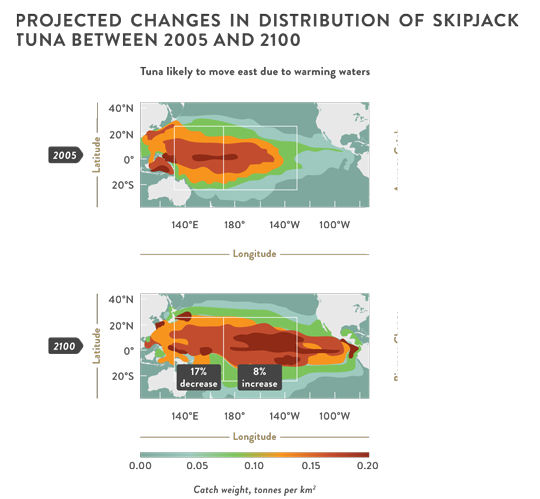


Food and nutrition
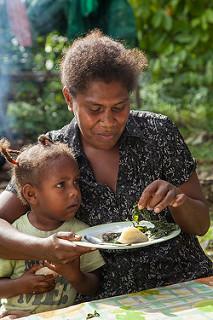
A mother and daughter share a meal in the Solomon Islands. Photo: F. Milovac (WorldFish)
Food security and nutrition are already at risk in the Pacific Island region, as the diets of rapidly growing urban population shift to cheaper and less nutritional imported food, such as white rice and wheat. The toll is already being felt, with high rates of obesity and diabetes impacting the entire region. Climate change may affect global wheat and rice production, increasing the costs of these imported food products. The upshot of this may be a renewed focus on the more climate-hardy Pacific staple food crops, focusing on good management of the region’s rich tuna resources.
Can climate change bring new opportunities?
In contrast to coastal fisheries, freshwater aquaculture in the Pacific Islands may win out under climate change, as conditions to grow Nile tilapia improve due to warming air temperatures and increased rainfall. In Vanuatu and Fiji, a warming temperature may increase opportunities for cacao production, a valuable export commodity. The report recommends countries “take advantage of any favourable impacts of climate change,” while also developing alternatives to the most highly threatened crops and fish.
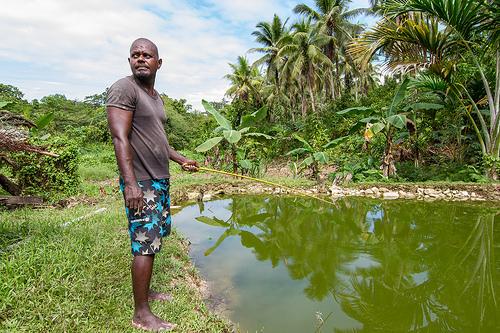
Marcus Rongodala uses a hook and line to catch Mozambique tilapia from his household fish farm in the Solomon Islands. Aquaculture may provide a climate-resilient source of food and income. Photo: F. Milovac (WorldFish)
Scenarios approaches to navigate change
To tackle uncertain futures, innovative approaches are needed to envision how different changes may play out on the ground. In 2015 a group of policymakers, researchers, civil society and businesspeople joined together to produce a set of four contrasting scenarios that will ultimately prove useful for developing and testing plans and strategies.
Read more:
- CCAFS blog: Future scenarios approach adopted in the Pacific
- Flyer: Testing climate and agriculture policy against future scenarios
- Huffington Post Blog by Bruce Campbell: Climate change and Pacific food systems: navigating a perfect storm
Download the report:
Bell J, Taylor M, Amos M, Andrew N. 2016. Climate change and Pacific Island food systems. CCAFS and CTA. Copenhagen, Denmark and Wageningen, the Netherlands.
About the report:
The report is published by the CGIAR Research Program on Climate Change, Agriculture and Food Security (CCAFS), the Pacific Community (SPC), WorldFish and The Technical Centre for Agricultural and Rural Cooperation ACP-EU (CTA), based on an ongoing research initiative in the region. The scenarios process was led by a team from Oxford’s Environmental Change Institute. This work was funded by the New Zealand Aid Programme and the Australian Centre for International Agricultural Research (ACIAR).
The CCAFS program is carried out with support from CGIAR Fund Donors and through bilateral funding agreements.

